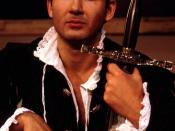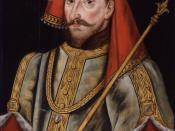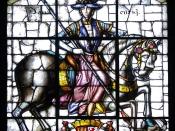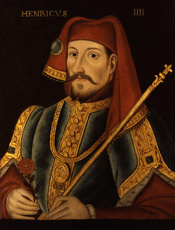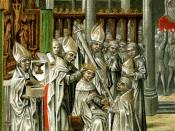In King Henry IV Part 2, we see the growth and maturation of Prince Hal, from a playful troublemaker ÃÂengraffed to FalstaffÃÂ, into the great man who will bring order to England and rid the country of injustice and lawlessness. Kingship, along with its qualities and demands, is one of the central themes of the play; skilfully interwoven within the scenes, and developed as a thread that gains momentum during the course of the play, culminating in the final coronation scene. The delicacy of the writing ensures that the audience will draw comparisons not only between the King and Hal, but between Prince John and his brother, by starkly contrasting characters and actions and clearly displaying the qualities that mark out Prince Hal as the most worthy successor to the sick Henry IV.
The first glimpse of Prince Henry sees him in discussion with Poins over his troubles. In this scene Henry is seen to been using Poins gain information on the general publics view of him, as Poins thinks ÃÂas every man thinksÃÂ.
Henry shows signs of remorse over his life of indulgence and waste, a clear understanding of what Kingship entails and the first evidence of sympathy for what his father must be going through. Prince Harry is genuinely sad that his father is ill ÃÂmy heart bleeds inwardly that my father is so sick.ÃÂ PoinsÃÂ reply implies that Henry is not sincere: ÃÂA most princely hypocriteÃÂ. This allows the audience an insight into the PrinceÃÂs former character from his friend Poins; but one which the audience can see is changing, as he appears to be genuinely remorseful. Furthermore, when Henry says with resolve: ÃÂLet the end try the manÃÂ, this crucial sentence is reaffirmation of the view that the Prince plans a drastic change in his lifestyle; he is asking Poins, and the people of England to judge him at the end of it.
The change and growth of Henry in this play is gradual, with the beginning of the transformation being seen here. The change from a boy to a man can be described as jerky, as Henry often takes two steps forward and one step back, as illustrated when he further disappoints his father by appearing to have ÃÂhunger for mine empty chairÃÂ. By the end of the scene and for the rest of the play, Hal is presented by Shakespeare as calm and in control ÃÂGive me my sword and coatÃÂ; he does not lose his temper, calculates the situation and then uses Poins and Bardolph to achieve his purpose. At the end of Act II scene 2 Hal commands ÃÂFollow me NedÃÂ. This shows he is finally taking control, and is taking on the mantle of his destiny.
The first appearance of King Henry IV is heralded with a soliloquy revealing his inner turmoil and unrest; he is unable to sleep ÃÂThat thou no more wilt weigh my eyelids down and steep my senses in forgetfulness?ÃÂ as he feels the burden of his position ÃÂuneasy lies the head that wears a crownÃÂ mentally dragging him down. The KingÃÂs preoccupation with his burdens and his illness touch upon the recurring themes of disease and disorder; the country seems to be plagued ÃÂA pox of this goutÃÂ. Shakespeare shows that political acts have consequences beyond the immediate actions, which puts a heavy burden on the politicians and monarchs who make those decisions, such as the deposition of Richard II, which haunts the lives of the perpetrators as well as their descendants. Henry IV keeps fighting for stability of the damaged country despite his illness, displaying a strong and steadfast resolve. His language exudes quiet control and confidence. He is clearly aware of what is wrong, and whilst weak, is still able to exercise or command control, something that the young Hal is clearly flexing his muscles towards.
Many comparisons may be drawn between King Henry IV and his estranged son. Both share the brutal pragmatism characteristic of the Lancastrian house. Henry IV, like his son, recognises his own significance ÃÂperfumed chambers of the greatÃÂ, and acknowledges his importance; this, however, is tinged with resignation at his weakness and inability to overcome his illness or the apostrophised sleepÃÂs reluctance to ÃÂsteepÃÂ his ÃÂsenses in forgetfulnessÃÂ. Whatever his state of mind, the King is a shrewd and ruthless ruler who does what is necessary to maintain power: ÃÂAre these things then necessities? Then let us meet them like necessities.ÃÂ As always, political expediency prevails. Even while dying, the KingÃÂs guidance to his son is not towards virtue but political expediency, being the harsh reality of kingship. The Prince is advised to ÃÂbusy giddy minds with foreign quarrelsÃÂ; to wage war to distract the country away from civil disorder.
In interpreting the significance of some of the themes and imagery employed by Shakespeare, such as decay and illness, it is important to understand the historical backdrop, along with the systems and beliefs of the era. At the time of writing the play, although England was enjoying a period of relative domestic stability due to Queen ElizabethÃÂs firm control over the various discordant groups within the country, there were continual wars overseas with Netherlands and Spain; and so the words: ÃÂbusy giddy minds. With foreign quarrelsÃÂ would have resonated with the audience, as a familiar device. The medieval view of the World was that, it was part of a divinely ordered and harmonious universe, with a clear social hierarchy containing the King at the apex of the pyramidal hierarchy, and the peasant at the bottom of the scale; they believed that the King ruled through divine right. The images of disorder and disharmony in the play are arguably due to the unhealthy state of society caused by the disposition of Richard, ÃÂbeing infected diedÃÂ as claimed by the rebels. Even though the sick Henry IV believes that this act has cast a shadow over his rule, he is still a successful King until his illness, and Prince Harry is shown as a potentially great King despite this legacy.
In Act IV scene 2, we see the cold pragmatism of Prince John as he strategically befriends the Rebel leaders, and lulls them into a false sense of security, ÃÂmy lord, these griefs shall be with speed redressedÃÂ, eventually leading to their death. He delivers this with incredible persuasive mastery, ÃÂDischarge your powers unto their several countiesÃÂ, expertly executed in a mechanical and phlegmatic way. The manner in which John deals with the problem was typical of the Lancastrian line, and would have been seen as the epitome of the methods employed by them; get the job done no matter what the collateral consequences. He is his fatherÃÂs son, and this scene reminds the audience of Lancastrian political expediency, Realpolitik ÃÂswear here, by the honour of my bloodÃÂ. In observing Prince John, the audience is reminded of Prince Henry, and inevitably comparisons are drawn. What prevents Prince John from being the hero in this play is the fact that he lacks the intellectual and emotional depth of his brother; despite JohnÃÂs obvious talents, and commanding skills, the audience is aware that Prince Henry has a greater potential than the automaton, Prince John. The sense of humanity present in both Henry and Westmorland, but lacking in John is the very thing that allows the audience to relate to the great men. The audience feels no connection to John, as he remains emotionless and detached throughout the scene, briefly punctuated by his display of contempt and disdain for the philandering Falstaff ÃÂthese tardy tricks of yoursÃÂ will break some gallowsÃÂ backÃÂ. The importance of this scene also lies in displaying the stark gap between political behaviour and morality, which inevitably influence the audienceÃÂs opinion of the King and his heirs.
Many of the scenes without Hal give the audience further insight into the methods of government prevalent at the time, and allows time to pass during which Prince Henry will have developed emotionally into the role of King. John eradicates the opposition, and it becomes clear to the audience that as Henry shares similar qualities to his brother, the battles with the enemies of the royal family and England will soon be won. Also, that Henry, with the skills of John, along with the emotional and intellectual range that he possesses, will not only become a great and powerful King, but an outstanding man by most standards. He acknowledges to his father the importance of the crown ÃÂAnd He that wears the crown immortally Long guard it yours! ÃÂ Then as your honour and as your renown, Let me no more from this obedience riseÃÂ. Henry V was seen by Elizabethans as the ideal of Kingship, due to his strength and success in bringing order and glory to the England. However, as Shakespeare makes clear, Hal had to sacrifice a part of him in achieving this; his youth and liveliness was suppressed for the sake of duty, as illustrated by his cold and calculated rejection of Falstaff ÃÂI know thee not, old manÃÂ. Hal did not let sentiment interfere with his duty to govern for the good of the Country. The Prince displays the entire qualities essential for a good King, he is inspiring, intelligent and focused, and uses these resources to achieve greatness. Some of his methods, his expediency and his pragmatism may seem immoral in ordinary life, for example the brutal rebuffing of Sir John ÃÂfall to thy prayersÃÂ, but as Shakespeare shows, they are necessary evils to achieve stability in uncertain times.
Shakespeare seamlessly integrates aspects of Kingship and duty within the story; painting a vivid picture of what is required and expected of a great ruler, and subtly delivers the message to the audienceÃÂs subconscious. The Lancastrian pragmatism, twinned with HalÃÂs humanity amalgamates to form a firm but fair King, who will unite the kingdom via a foreign war. The comparisons with the other royals further strengthen the audienceÃÂs respect for Hal and provide hope for future greatness. The journey of the Prince from frivolity to greatness and his resolve to live up to the dignity of the office he accepts, not only represents the development of Kingship, but also provides hope for similar improvement in the fortunes of England.
BibliographyWikipedia - article on Henry IV Part IIMicrosoft WordMac OS XHenry IV Part II - William Shakespeare
